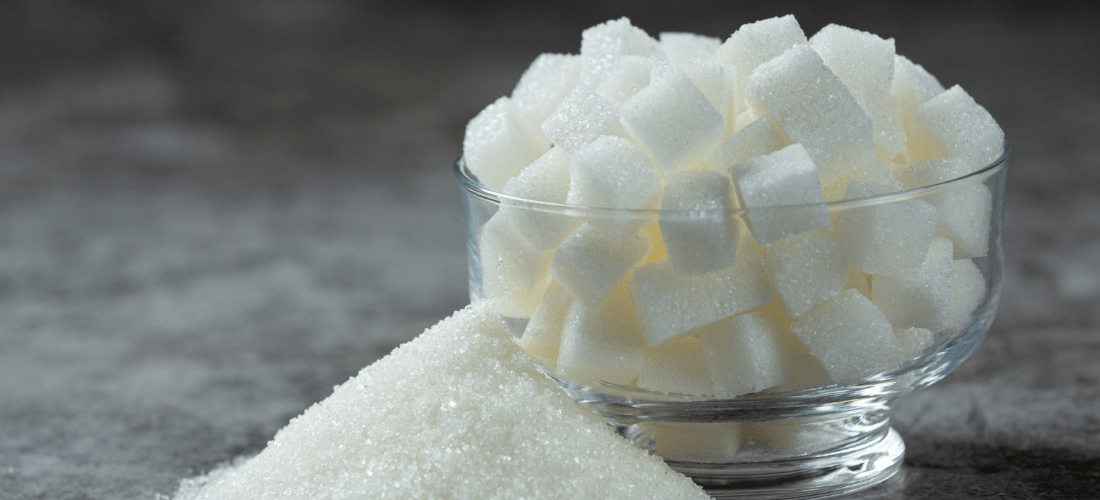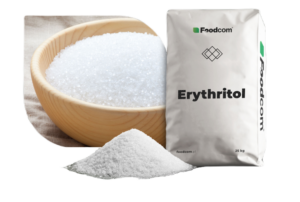Erythritol, also known as erythritol and designated E968, belongs to the group of polyols, or sugar alcohols. It occurs naturally in small amounts in fruits such as pears, grapes and watermelons, as well as in some mushrooms and fermented products. On an industrial scale, however, it is most often produced by fermenting glucose with yeast or special strains of fungi. It is a low-calorie ingredient that falls into the category of natural sweeteners.
What exactly is erythritol? – properties
The most important feature of erythritol is its extremely low calorie content – 0.2 kcal/g, which means that in practice it can be treated as an almost calorie-free product. It has about 60-70% of the sweetness of sucrose, but does not raise blood glucose levels or affect insulin, making it particularly attractive for people with diabetes and insulin resistance.
Erythritol also stands out for its technological properties. It is thermally stable, dissolves well in water and gives food a slightly cooling aftertaste, which is desirable in chewing gum or drinks, for example. In addition, it does not promote tooth decay, which is why it is often used in children’s products and toothpastes.
Types of erythritol – how do they differ?
There are different variants of this sweetener available on the market. The basic division includes:
- crystalline erythritol – in the form of small crystals, resembling classic sugar in appearance, used mainly in the food industry,
- powdered erythritol – finer, highly soluble, used in the production of dietary supplements and protein bars,
- organic erythritol – sourced from certified sources, obtained from organic agricultural raw materials, meeting the growing demands of the eco market.
It is organic erythritol that is currently gaining particular popularity – consumers are paying more and more attention to the origin of ingredients and the process of their production.
How is erythritol produced?
The production process is based on the fermentation of glucose using yeast of the genus Moniliella pollinis or Trichosporonoides megachiliensis. After fermentation, erythritol is purified, crystallised and dried. This results in a high-purity product that is safe and complies with strict international standards.
The industry is also increasingly investing in biotechnological innovations that allow for more efficient production with lower energy and water consumption. This is one of the reasons why erythritol is seen as an ingredient of the future.
The use of erythritol in various industries
Although most people associate erythritol mainly as a substitute for table sugar, its use is much broader:
- food industry – production of beverages, confectionery, bakery products, chewing gum and desserts,
- functional and sports foods – an ingredient in protein bars, protein powders and sports supplements,
- pharmaceuticals – a carrier for active substances in dietary supplements,
- cosmetics – an ingredient in toothpastes and care products due to its antibacterial properties,
- products for diabetics – an alternative to classic sugars and syrups.
Importantly, erythritol is characterised by excellent stability, thanks to which it can be used in processes requiring heat treatment without losing its properties.
Innovative uses for erythritol
More and more studies show that erythritol can play an important role not only in diet foods, but also in the development of so-called foods of the future. Scientists are analysing its impact on the gut microbiome – initial results suggest that it is not metabolised by most gut bacteria, so it does not cause bloating or discomfort, which can be a problem with other polyols such as sorbitol or xylitol.
Another interesting area of research is the use of erythritol in the production of biodegradable packaging and edible materials. Thanks to its chemical stability and biological safety, this sweetener may become an ingredient in innovative solutions combining ecology and the food industry.
The potential of erythritol in the diet of people who care about their cardiovascular system is also significant. Research into its effect on oxidative stress and free radicals is still ongoing, but scientists emphasise that polyols such as erythritol may have antioxidant properties. This opens the way for even wider use of this product in dietary supplements and functional foods.
Consumer trends and legal regulations
With the growing popularity of sugar-free diets and healthy lifestyles, erythritol has become one of the most popular sweeteners. Consumers value it not only for its low calorie content, but also for its natural origin.
Legal regulations, including the approval of erythritol as a food additive in the European Union under the number E968, have further increased its credibility. Research on the health effects of erythritol is also being conducted worldwide, confirming its safety in long-term use.
Where to order erythritol and how is it distributed?
For companies in the food and pharmaceutical industries, an important question is: where to order a proven raw material in large quantities? Most often, specialised suppliers are used, who offer erythritol wholesale in various forms and weights.
Innovative sales models, such as the FDCM platform, are playing an increasingly important role in the market. This allows companies not only to optimise costs, but also to ensure a continuous supply of high-quality raw materials.
Erythritol in the future – why is it worth investing in?
Global trends indicate that the demand for natural sweeteners will grow steadily. Thanks to its unique characteristics – safety, low glycaemic index, technological stability – erythritol has the potential to become one of the most important ingredients in the food of the future.
Companies that are already investing in its use can not only meet consumer expectations, but also gain a competitive advantage. Combined with the growing availability of variants such as organic erythritol, the market for this sweetener appears to be extremely promising.







